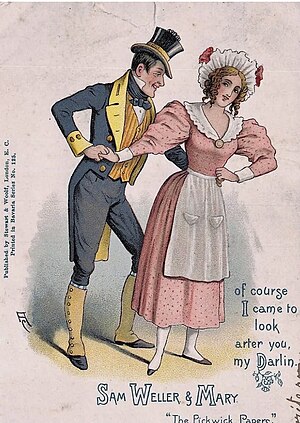The Pickwick Papers
 Sam Weller and Mary | |
| Original Title: | The Posthumous Papers of the Pickwick Club, Containing a Faithful Record of the Perambulations, Perils, Travels, Adventures and Sporting Transactions of the Corresponding Members |
|---|---|
| Written by: | Charles Dickens |
| Central Theme: | |
| Synopsis: | |
| First published: | 1837 |
The Posthumous Papers of the Pickwick Club, Containing a Faithful Record of the Perambulations, Perils, Travels, Adventures and Sporting Transactions of the Corresponding Members is usually known as simply The Pickwick Papers.
Charles Dickens' first novel and still one of his best known, it's a far more comedic read than his later stuff, although with strong touches of darkness, especially the Fleet Prison part of the book.
First published in 1837 (but set in 1827-28, a fact Dickens sometimes forgot in his writing), it was originally a 20-part serial. It follows the misadventures of a bunch of comedy clichés as they go about southern England. Along the way, a variety of interesting side-stories are related.
It wasn't doing too well, sales wise, until Samuel Weller entered the story. Weller, an early example of the chirpy Cockney archetype, is prone to punching people with little provocation, dispensing Cockney wisdom and engaging in an entire series of "as the X said" jokes, but adding something before and afterwards, such as:
As can be seen from the above quote, the Cockney accent has changed a lot since 1837; without Dickens's habit of using Funetik Aksent to show Weller's pronunciation, this fact would be unknown to modern linguists.
The book became a literary phenomenon, Weller became a very popular character and the book became subject to one of the earlier major cases of book piracy.
Contains the best surviving fictional account of a pre-1832 British by-election, an account of the Fleet debtors' prison that was a major eye-opener at the time and some rather good Lampshade Hanging on a couple of tropes.
Includes a character, Joe, who is rather obese and falls asleep frequently with no warning. This is exactly like the condition Obesity-Hypoventilation Syndrome, which is also known as "Pickwickian syndrome" because of it.
- Adult Child (Tony Weller)
- Amoral Attorney
- Battle Butler (Sam Weller is a minor version, as well as a Hypercompetent Sidekick)
- Christmas Cake (Miss Wardle, who gets two admirers, although only one of them is sincere. Arguably Mrs Bardell.)
- Crowning Moment of Funny
- Fainting (the sheer amount of it and the way in which it's handled by Dickens suggests he's going for comedy)
- Ensemble Darkhorse: A matter of public record. The popularity of Sam Weller almost single-handedly kicked off Dickens' success as an author.
- Funetik Aksent (the Wellers)
- Good Is Dumb
- Heterosexual Life Partners
- Honor Before Reason
- In Which a Trope Is Described
- Lampshade Hanging (ghosts haunting the places that caused them most woe, fainting)
- Lighter and Softer (compared to other parts of Dickens' oeuvre)
- Luxury Prison Suite (Mr Pickwick gets one in the Fleet since he can afford it, although Dickens also shows the nastier aspects of debtors' prisons)
- Mistaken Declaration of Love
- Narrative Profanity Filter
- No Communities Were Harmed ("Eatanswill"[1] the location of the by-election is stated to be a disguised East Anglian town. It's generally thought to be either Sudbury or Ipswich. G.K. Chesterton, for this part, thought Dickens was just satirising England in general]]
- Once More with Endnotes
- Present Day Past (Dickens has characters referencing events that haven't occurred in their world yet)
- Strange Syntax Speaker (Jingle)
- The Power of Trust
- Under the Mistletoe
- Urban Legend Love Life (Tupman)
- Where Are They Now? Epilogue
- Zany Scheme
- ↑ Yes, think about the name